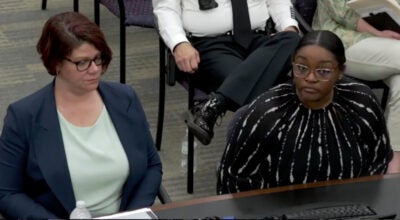High court decision on sweepstakes takes effect
Published 12:00 am Friday, January 4, 2013
RALEIGH (AP) — A darkened video sweepstakes parlor near the North Carolina State University campus told players Thursday much the same thing similar businesses in hundreds of storefronts statewide believe: They’ll be back.
Law enforcement agencies on Thursday planned to start enforcing a state Supreme Court decision upholding a ban on video sweepstakes machines. But operators said they’ll respond by changing the machines in ways that escape the ban and keep attracting players without much delay.
“We are performing upgrade of games according to the statute of NC,” a sign on the Raleigh shop called Jackpot Sweepstakes informed customers. The shop closed late Wednesday and promised to reopen Friday.
Thousands of sweepstakes hall employees may lose their jobs as the industry fights for its future in court, industry spokesmen said. The U.S. Supreme Court last week rejected the industry’s request to block state enforcement while businesses appealed to the country’s highest court, a step expected by mid-March.
“Probably 90 percent of the operators will close down voluntarily,” said Brad Crone, a spokesman for the Internet Based Sweepstakes Operators. “Some operators may be looking at new software and new gaming options that will more than likely have to be tested in a series of new court cases.”
Gov.-elect Pat McCrory said Thursday the ban will be revisited somehow “because of all the legal maneuvering and interpretations” by the industry. McCrory said he would also speak with legislative leaders soon about the issue.
Sweepstakes halls have cropped up because of what state Supreme Court justices called a loophole since the state outlawed video poker machines in 2007. Sweepstakes parlor patrons buy Internet or phone time that gives them the opportunity to uncover potential cash and prizes with mouse clicks on a computer screen.
Last month the court ruled in two cases that a 2010 state law banning sweepstakes machines as a form of gambling regulates the act of playing, which opponents say feeds the same gambling addictions as traditional video poker machines. The industry had argued there’s no gambling because prizewinners are predetermined.
Enforcement of the video sweepstakes ban was expected to vary widely around the state.
In Waynesville in the state’s western mountains and Carteret County on the Atlantic coast, officers visited stores that offered the games to make sure machines were off. Out of the 13 businesses Carteret deputies checked, two remained opened Thursday but shut down sweepstakes machines after deputies arrived, the sheriff’s office said.
In Roanoke Rapids, where the machines are credited with helping the city pull itself out of a financial mess, local police planned no action on the advice of their legal adviser, Police Chief J.K. Hinton said.
The Royal Palace Theatre pared back from about 250 machines to 120 after removing machines that violate the state law and reprogramming and replacing others, said Jay Hickey of HSV Entertainment. The company is leasing the 1,500-seat former Roanoke Rapids Theatre, which city officials built after borrowing $21.5 million in 2005 to attract tourists and help boost the economy. HSV has mixed sweepstakes games with live shows to try reversing a disappointing city investment that left taxpayers on the hook.
The revenue-generating potential of the sweepstakes games was pointed out in the first sentence of a letter Roanoke Rapids City Attorney Gilbert Chichester sent Monday to police, the Halifax County sheriff, and the local district attorney. Chichester said the state law specifies it’s illegal to conduct a sweepstakes if the prize is revealed via an “entertaining display.” So the Royal Palace Theatre’s new machines simply state in plain text whether or not the purchaser has won anything, with any game play coming after the result is revealed, Chichester said.
“They qualify as legal under the law,” Hickey said.
Roanoke Rapids City Manager Joseph Scherer said the theater and eight other storefront shops operating a few machines each are now determined to comply with state law.
“It’s not that we’re not enforcing the Supreme Court decision,” Scherer said. “The machines are changed to be in compliance with the general statute. We feel we’ve done our enforcement responsibility.”



